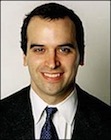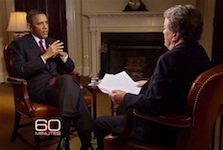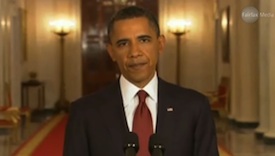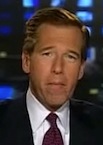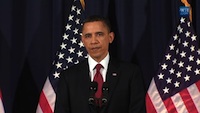
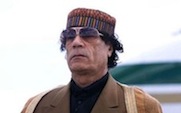
Barack Obama, speaking about Libya, and Muammar Gaddafi, the longest-lasting dictator in the world
Above the Fold
I think it does show a huge amount of decay, distrust, and breakdown at the heart of the
Gaddafi regime.
–British Prime Minister David Cameron, speaking Thursday about the defection of Libyan foreign minister Moussa Koussa in London.
Although the Libyan rebels have been pushed back sharply by Gaddafi loyalists during the last forty-eight hours, the defections of Libyan foreign minister Moussa Koussa and former foreign minister Ali Abdussalam Treki (who only last month was appointed to replace the Libyan mission to the United Nations, after it resigned en masse), strongly suggest that the center around the world’s longest-serving dictator is dissolving so quickly, there may soon be no one left to cling to him except for his own sons.
Koussa was a Gaddafi intimate (and former Libyan intelligence chief) who should bring the NATO coalition crucial information about
Gaddafi’s remaining capabilities. He and Treki were the eighth and ninth senior Libyan officials to flee the regime, following the former Justice and Interior Ministers, a former head of Libya’s national planning council, a Gaddafi cousin who was one of his closest advisors—and the Libyan ambassadors to the United States, the United Nations, the Arab League, India, and Indonesia.
Timesman David Kirkpatrick, who has led splendid coverage of the uprisings in Egypt and Libya, reported Thursday night that Tripoli residents were “in shock” over the defections of the two former foreign ministers, and “rumors swirled of a cascade of high-level defections.”
Meanwhile, the chattering classes on both sides of the aisle in Washington remain furious because the Obama administration refuses to predict how the war in Libya will end. “What is the end game?” is their constant, ridiculous refrain.
If only the Obama administration were more like its predecessor, there would never be any uncertainty about the outcome of any military operation. Thus, in February, 2003, before the invasion of Iraq, Donald Rumsfeld and his deputy Paul Wolfowitz were both certain that Gen. Eric K. Shinseki had been crazy to suggest that several hundred thousand troops would be needed to pacify Iraq. Wolfowitz told Congress he was also sure 100,000 would be plenty—partly because there was “no history” of ethnic conflict in Iraq!
Wolfowitz was equally certain that the upper estimate of the cost of the war in Iraq—$97 billion—was way too high. The generally accepted figure today is at least $1 trillion.
But no one on television in Washington can remember anything that happened earlier than the day before yesterday, so the cable crazies (and the echo chamber of the wackosphere) continue to highlight the keen insights of Republican sages (and of quite a few Democrats) into the alleged dangers of the current operation in Libya.
Donald Trump is worried that Libya could end up as a pawn of Iran because of the allies’ air operation—even though, as the indispensable Juan Cole has pointed out, “Iran’s Supreme Leader Ali Khamenei roundly condemned the US action in Libya, accusing Washington of seeking a toehold in that country. In other words, bringing up some sort of alleged link of the Benghazi provisional government, which has reached out to Washington, and Iran is about the stupidest thing anyone could say about the situation.”
Similarly, the brilliant Michelle Bachman opined that, “We don’t know if this is led by Hamas, Hezbollah, or possibly al Qaeda of North Africa. Are we really better off, are United States, our interests better off, if, let’s say, Al-Qaeda of North Africa now runs Libya?”
Cole noted that “Hezbollah is a Shiite movement of southern Lebanon. There are no Shiites in North Africa, where almost all Muslims are Sunni. Hamas is a Palestinian movement and does not have a branch franchise in Libya. The people of Benghazi and Misrata, together amounting to 1.3 million, the backbone of the liberation movement, are not al-Qaeda, which is not a mass movement. In fact, al-Qaeda in the Islamic Maghreb is like a few hundred guys and is an Algerian organization. I know, I know, pointing out that Michelle Bachmann has said something uninformed is like pointing out that Lady Gaga has done something outrageous.”
And then there is Newt Gingrich, a completely discredited demagogue whose only purpose in life is to enrich himself through dubious get-rich-quick schemes—and yet remains among the most popular of all guests on all the Sunday chat shows. Newt has the distinction of having been strongly in favor of a no fly zone—until Obama implemented one. Then, of course, Gingrich was totally against it.
The truth is, the speech that Obama gave earlier this week about Libya embodied all of the qualities which attracted so many of us to him in the first place: He was rational, he was intelligent, he had an impressive grasp of the issues at hand—and he was persuasive.
While those same Washington talking heads demanded to know whether our action in Libya represented some kind of new Obama doctrine—and if not, why not—the president was careful to explain exactly why what was appropriate for us to do here would not work elsewhere in the region:
Much of the debate in Washington has put forward a false choice when it comes to Libya. On the one hand, some question why America should intervene at all — even in limited ways — in this distant land. They argue that there are many places in the world where innocent civilians face brutal violence at the hands of their government, and America should not be expected to police the world, particularly when we have so many pressing needs here at home.
It’s true that America cannot use our military wherever repression occurs. And given the costs and risks of intervention, we must always measure our interests against the need for action. But that cannot be an argument for never acting on behalf of what’s right. In this particular country — Libya — at this particular moment, we were faced with the prospect of violence on a horrific scale. We had a unique ability to stop that violence: an international mandate for action, a broad coalition prepared to join us, the support of Arab countries, and a plea for help from the Libyan people themselves. We also had the ability to stop Gaddafi’s forces in their tracks without putting American troops on the ground.
To brush aside America’s responsibility as a leader and — more profoundly — our responsibilities to our fellow human beings under such circumstances would have been a betrayal of who we are. Some nations may be able to turn a blind eye to atrocities in other countries. The United States of America is different. And as President, I refused to wait for the images of slaughter and mass graves before taking action.
While Juan Cole has provided the most intelligent defense of the president’s decision from the left, The Economist has performed the same service from the center right. Its Libyan leader a week ago was refreshingly sane, and—so far—remarkably prescient:
One of the skeptics’ complaints “is that the West has entered this campaign without defining the mission,” the magazine wrote. “That is both unfair and true…because dictators do not work to a diplomatic timetable. Colonel Gaddafi’s rapid advance to Benghazi meant that the outside world had to intervene within days or not at all.”
It’s clear that one reason Obama finally decided to act was that he became convinced that what is actually an extremely modest military operation—especially in comparison with Iraq and Afghanistan-—has at least the potential of achieving an extremely positive outcome.
As the Economist pointed out,
Libya is not Iraq. The West has learned through bitter experience to avoid the grievous mistakes it made from the outset of that venture. For one thing, the current mission is indisputably legal. For another, it has, at least for now, the backing of Libya’s own people and–even allowing for some wobbles from Turkey and the Arab League–of most Arab and Muslim countries. Libya’s population is a quarter the size of Iraq’s, and the country should be easier to control: almost all its people, a more homogeneous lot albeit with sharp tribal loyalties, live along the Mediterranean coastal strip. If Colonel Gaddafi’s state crumbles, the West should not seek to disband his army or the upper echelons of his administration, as it foolishly did in Iraq. The opposition’s interim national council contains secular liberals, Islamists, Muslim Brothers, tribal figures and recent defectors from the camp of Colonel Gaddafi. The West should recognize the council as a transitional government, provided that it promises to hold multiparty elections. Above all, there must be no military occupation by outsiders. It is tempting to put time-limits on such a venture, but that would be futile.
The Economist’s conclusion is especially on target:
Success in Libya is not guaranteed—how could it be? It is a violent country that may well succumb to more violence, and will not become a democracy any time soon. But its people deserve to be spared the dictator’s gun and be given a chance of a better future.
And if Obama had remained motionless while Gaddafi had carried out his planned massacre of the rebel residents of Benghazi, the reaction of Republicans and everyone else would, of course, have been vastly more violent than any of the criticism the president has endured so far for acting—carefully, and intelligently.
-30-




